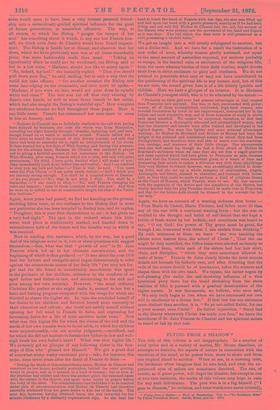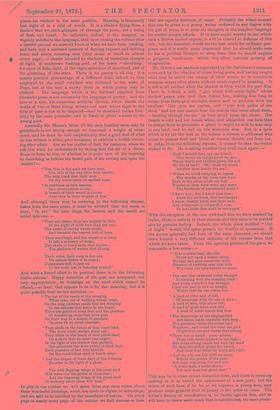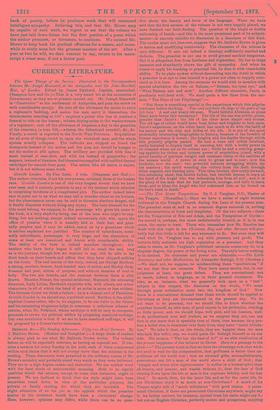FLYING FROM A SHADOW.*
THE title of this volume is not inappropriate. In a number of brief lyrics and in a variety of metres, Mr. Moore describes, or attempts to describe, the aspects of nature in connection with the emotions of the mind, as he passes from shore to shore and from one tropical island to another. When at sea, in a morning mist, the landsman often imagines that he sees land, and even the ex- perienced eyes of sailors are sometimes deceived. The sun, of course, as it gains power, will dispel the illusion; but except in one or two rare instances, the reader of this volume may hope in vain for any such deliverance. The poet who is in a fog himself (" I gaze in dimness," he exclaims, and truer words were never uttered), a Flying from a Madow: a Work Wanderings. Vol. I.—"To Southern Seas." By Frank Frankfort Moore. Smith, Elder, and Co. 11372.
places his readers in the same position. Meaning is frequently lost sight of in a mist of words. It is a shadow flying from a shadow that we catch glimpses of through the poem, not a being of flesh and blood. So indistinct, indeed, is the imagery, so vaguely indefinite the language, that upon closing the volume after a careful perusal we scarcely know of what we have been reading, and have only a confused memory of floating vapours and drifting foam, and misty, moaning seas (they moan or throb in almost every page), of shores haunted by shadows, of tremulous changes of light, of sunbeams flashing gold, of the moon "shredding" her snow of flake-light, of the vague splendour of cloudland, and of the glistening of the stars. There is no poetry in all this ; it is merely poetical phraseology, of a different kind, indeed, to that employed by the small versifiers who followed in the wake of Pope, but at the beat a showy dress in which poetry may be clothed. The language which is the furthest removed from idiomatic prose is not necessarily the language of poetry ; and the
love of a rich, but somewhat artificial diction, which marks the works of two or three living writers—of men whose right to the title of poet is not to be disputed—may be cherished rather fool- ishly by the mere poetaster, and is likely to prove a snare to the
young poet.
Assuredly Mr. Moore's Muse (if the once familiar term may be
permitted) is not strong enough to bear such a weight of orna- ment, and he must be told emphatically that a good deal of what he has written is either pure nonsense, or exhibits a foolish strain- ing after effect. Are we too matter-of-fact, for instance, when we ask him what he understands by saying that the air of a dream floats in form to him, or whether he is quite sure of his meaning in describing as follows the broad path of the setting sun upon the
waters ?—
" Yea, this is thy path we have seen,
Yea, this is the way thou halt known ; The only track that hath been
On thy waste since its earliest tone.
"It stretches on into heaven,
Into secret places of sky; A breath of their secret is driven Over thee in their wonder of dye."
And although there may be meaning in the following stanzas, taken from the same poem, it must be allowed that the sense is hazy, "In eve" the poet sings, the heaven and the world are rolled into one :—
" They are claspt, they are mighty in love,
In the night of their love they are one ; The ocean of strong waves above, And beneath the heaven rich of tone.
" They are claspt, and the sound of a voice Is felt, a mystery of song ;
The shout of freed souls that rejoice ; The gladness of waters that throng.
• Their voice, their song is but one, We cannot divide it in sound ; Unseparate still it goes on To the souls lost in listening around."
And what a forced effort to be poetical there is in the following feeble stanzas ! Happy memories of the past are compared, not very appropriately, to footsteps on the sand which cannot be effaced, —at least, that appears to us to be the meaning, but it is
quite possible that we are mistaken :-
" Far out of the reach of the creeping White seas, out of washing waves' reach, On the long pathless sands that are sleeping In the sadness that stays to the beach, There are prints of some feet, and the pressure Of wandering steps that have past On their way in a season of pleasure, On eves by no cloud overcast.
"They abide on the beach of that coast-land, The worn water washes them not ; They abide on the beach of that ghost-land, On a shore that no heart has forgot ; In the light of the shadow that guideth, She perceives the worn prints of dead days ; Each pressure of foot that abidoth On the comfortless sand of beach-ways.
"And the shapes of those days of the distance Re-arise in the light of a ghost . . . . The wild-flapping wings of the coast-bird Will wave o'er the prints of those feet ; And the lingering wings of the ghost-bird Of memory about them will beat."
In pity to our readers we will spare them any more verses about these wonderful footsteps, which are made to rhyme to mute steps, and are said to be infolded by the moonlight of heaven. On every page or nearly every page of the volume we find stanzas or lines that are equally destitute of sense. Probably the wisest counsel that can be given to a young writer endowed in any degree with the gift of verse, is to utter his thoughts in the simplest language his mother-tongue affords. If he have aught worthy to say which such a diction cannot express, it will be uttered in defiance of this rule; but the homeliest words are the beet words for ordinary pur- poses, and it is vastly more important that he should make sure ho has a poetical thought to utter, than that he should acquire a gorgeous vocabulary, which too often conceals poverty of imagination.
Mr. Moore's ear has been captivated by Mr. S winburne's resonant verse and by the rhythm of other living poets, and having caught what may be called the twang of their music, he is content to compose stanza after stanza without much regard to meaning. It is not at all evident what the shadow is•from which the poet flies. There is, indeed, a lady, "girt about with misty light," whose shadow passes now and then before him, making him long to escape from these grey northern shores, and to go forth with the swallow. Her eyes are joyless, and " pale with pallor of the
skies," and her ears cannot hear the sounds that come about them, " fainting through the air," as they stand upon the shore. Her breath is cold and her hands white, and altogether one feels that to escape from so gruesome a ghost it might be well to take ship to any land, and to sail on the stormiest seas. But in a lyric which is by far the beat in the volume a woman is addressed who seems to possess flesh and blood as women should, and from her, to judge from the following stanzas, it cannot be that the writer wished to fly. He is asking whether they shall meet again :— 0 Shall I behold thee, my one friend,
Who lovost all things loved by me ; Whose warm and faithful grasp did end My life of land? Oh! shall we spend Another hour beside the sea ?
" Where we loved straying, to repeat The wonder of the verse new-born Each to the other, shall our feet Wander as they were wont, and meet The freshness of sea-scented morn ?
"I know not; but I know thee true ; Amid the faithless, thee unchanged ; I know, though lands and faces new, And strangeness of (ill world 1 view, No love from thee shall be estranged."
With the exception of the one awkward line we have marked by italics, there is melody in these stanzas, and they seem to be marked also by genuine feeling. Indeed, the whole piece entitled " Out of Sight" would, did space permit, be worthy of quotation. If the poems generally had been of the same character, we should have formed a very different estimate of the volume from that which we have taken. From the opening portion of the poem we transcribe a few verses :—
" It is a noble land, the tide
Flows not upon a nobler shore,' We say, and gaze across the wide Distance of swelling seas that hide The coast our eyes behold no more.
" The care that saddened every thought Is sleeping with the sleeping coast ; And every sorrow it has wrought Upon our soul is now as nought Within that far sea-vision lost.
" A land of river and of bill, Of mountain with the sea in view ; A land of vale, with silver rill ; A land of quiet lakes and still ; A land of noble hearts and true.
"The wood-ways of the singing-bird Are there, made beautiful with song ; The pastures where the silent herd Wanders ; and round the coast the gird Of glorious sea and waves that throng.
"There war is hated; peace adored From rich fields mellow in her light ; But there strong hands but wait the word To drop the sickle, grasp the sword, And shed true blood for truth and right.
"And we who see her cliffs no more, Behold the glories of the past ; Nor cease repeating o'er and o'er, 'A noble land, a noble shore ; For ever may her glory last !' "
This may be to some extent imitative verse, and there is certainly nothing in it to herald the appearance of a new poet ; but the writer of such lines, if he be, as we suppose, a young man, may produce some grateful fruit of poetry in the years to come. The writer's fluency of versification is, no doubt, against him, and he will have to throw aside much that is meretricious, the mere pinch- beck of poetry, before he produces work that will command intelligent sympathy. Believing this, and that Mr. Moore may be capable of such work, we regret to see that the volume we have just laid down forms but the first portion of a poem which the author promises, or threatens, to continue. We counsel Mr. Moore to keep back his poetical effusions for a season, and mean- while to study none but the greatest masters of the art. After a year or two he will, we dare venture to say, return to his manu- script a wiser man, if not a better poet.




































 Previous page
Previous page